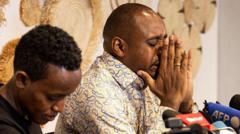In a controversial decision, Guinea's governing junta has pardoned Moussa Dadis Camara, the former military leader sentenced to 20 years for his role in the 2009 stadium massacre that left over 150 dead and many more sexually assaulted. The pardon, announced on state television, cites health issues as the reason for this unexpected clemency. Meanwhile, the current military government has revealed plans to compensate victims of the massacre, a move that follows a lengthy trial ending in Camara’s conviction along with several commanders.
Pardon Granted to Guinea's Former Leader for 2009 Stadium Massacre

Pardon Granted to Guinea's Former Leader for 2009 Stadium Massacre
Former military ruler Moussa Dadis Camara receives a presidential pardon amid ongoing compensation efforts for victims of a tragic massacre.
Camara's return after an assassination attempt led him to flee the country has sparked mixed reactions—from his brother's expression of gratitude to the prevailing concerns about justice for the victims. The pardon raises questions about the commitment to addressing historical grievances in a nation still haunted by the scars of military rule.
Authorities are set to disburse compensation, pegged at significant amounts for various categories of victimization. Despite the state’s efforts to make amends, the ramifications of the massacre and Camara's legacy continue to weigh heavily on Guinea's political landscape, as it navigates its turbulent history toward a more stable future.
Following is a breakdown of the compensation plan:
- $173,000 for each rape survivor
- $115,500 for victims of death or disappearance
- $57,000 for cases related to looting
- $23,000 for instances of torture
The military junta’s decision to pardon Camara and their simultaneous effort to provide reparations reflects the complex interplay between justice and political maneuvering in post-conflict Guinea.
Authorities are set to disburse compensation, pegged at significant amounts for various categories of victimization. Despite the state’s efforts to make amends, the ramifications of the massacre and Camara's legacy continue to weigh heavily on Guinea's political landscape, as it navigates its turbulent history toward a more stable future.
Following is a breakdown of the compensation plan:
- $173,000 for each rape survivor
- $115,500 for victims of death or disappearance
- $57,000 for cases related to looting
- $23,000 for instances of torture
The military junta’s decision to pardon Camara and their simultaneous effort to provide reparations reflects the complex interplay between justice and political maneuvering in post-conflict Guinea.



















